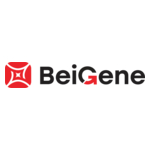Tislelizumab is now approved in six indications in China
This marks tislelizumab�s third approved lung cancer indication in China and first in a previously treated patient population
The approval was supported by results from the global Phase 3 trial RATIONALE 303, in which tislelizumab significantly prolonged overall survival in these patients compared to docetaxel and was generally well-tolerated, consistent with known risks
CAMBRIDGE, Mass. & BEIJING--(BUSINESS WIRE)--$BGNE #BGNE--BeiGene (NASDAQ: BGNE; HKEX: 06160; SSE: 688235), a global, science-driven biotechnology company focused on developing innovative and affordable medicines to improve treatment outcomes and access for patients worldwide, today announced that the China National Medical Products Administration (NMPA) has approved BeiGene�s anti-PD-1 antibody tislelizumab as a second- or third-line treatment for patients with locally advanced or metastatic non-small cell lung cancer (NSCLC). A supplemental biologics license application for tislelizumab in this indication was previously accepted for review by the China NMPA in March 2021.
�This latest approval for tislelizumab demonstrates BeiGene�s commitment to bringing innovative, impactful treatments to patients in need. With six approved indications in China, tislelizumab has the potential to reach and help the country�s large patient community, and our science-based commercial team of nearly 3,000 people in China is working to make it more broadly available to those who may benefit from this important immunotherapy,� commented Xiaobin Wu, Ph.D., President, Chief Operating Officer, and General Manager of China at BeiGene. �As our strategic oncology collaboration with Novartis deepens, we look forward to continued opportunities to expand access to tislelizumab globally and further explore its therapeutic potential.�
�As its third approved lung cancer indication in China, today�s approval represents an important milestone, with tislelizumab now available in both front-line and second- or third-line care of NSCLC. We hope, as demonstrated in the promising results from the global RATIONALE 303 trial, that tislelizumab will become an important treatment option for these patients in China,� commented Yong (Ben) Ben, M.D., Chief Medical Officer, Solid Tumors at BeiGene. �Tislelizumab�s broad global development program of 13 Phase 3 trials and four pivotal Phase 2 trials is providing a growing body of clinical evidence on its efficacy and safety and establishing its therapeutic impact across multiple cancer types.�
�In the global Phase 3 trial, tislelizumab demonstrated a significant improvement in overall survival and was well-tolerated in patients with previously treated NSCLC,� said Caicun Zhou, M.D., Ph.D., Director of the Department of Oncology at Shanghai Pulmonary Hospital, Director of Cancer Institute of Tongji University, and the principal investigator of the trial. �The NMPA�s approval of tislelizumab is welcoming news to the lung cancer community in China, and we hope this immunotherapy will help address the unmet needs in second- or third-line treatment of NSCLC.�
The approval of tislelizumab was supported by clinical results from a randomized, open-label, global Phase 3 trial RATIONALE 303 (NCT03358875) comparing tislelizumab to docetaxel in the second- or third-line setting in patients with locally advanced or metastatic NSCLC who have progressed on prior platinum-based chemotherapy. A total of 805 patients in 10 countries across Asia, Europe, the Americas, and Oceania were enrolled in the trial, randomized 2:1 to either the tislelizumab arm or the docetaxel arm.
As announced in November 2020, the trial met the primary endpoint of overall survival (OS) at the planned interim analysis, as recommended by the independent Data Monitoring Committee (IDMC). Tislelizumab was generally well-tolerated, consistent with known safety risks from previously reported results across different tumor types, with no new safety signals identified. The results of the interim analysis of the trial were presented at the American Association for Cancer Research (AACR) Annual Meeting and announced by BeiGene in April 2021.
About Non-Small Cell Lung Cancer
Lung cancer remains the second most common type of cancer and the leading cause of cancer-related death worldwide.1 NSCLC accounts for approximately 85% of all lung cancer cases and is usually diagnosed at an advanced stage.2 The five-year survival rate with treatment for stage IIIB and stage IV NSCLC is 5% and 2%, respectively.3 In China, the lung cancer incidence rate is increasing, with approximately 815,563 new cases in 2020.4,5
About Tislelizumab
Tislelizumab (BGB-A317) is a humanized IgG4 anti-PD-1 monoclonal antibody specifically designed to minimize binding to Fc?R on macrophages. In pre-clinical studies, binding to Fc?R on macrophages has been shown to compromise the anti-tumor activity of PD-1 antibodies through activation of antibody-dependent macrophage-mediated killing of T effector cells. Tislelizumab is the first drug from BeiGene�s immuno-oncology biologics program and is being developed internationally as a monotherapy and in combination with other therapies for the treatment of a broad array of both solid tumor and hematologic cancers.
The China National Medical Products Administration (NMPA) has approved tislelizumab in six indications, including full approval for first-line treatment of patients with advanced squamous non-small cell lung cancer (NSCLC) in combination with chemotherapy, for first-line treatment of patients with advanced non-squamous NSCLC in combination with chemotherapy, and for second- or third-line treatment of patients with locally advanced or metastatic NSCLC who progressed on prior platinum-based chemotherapy. NMPA also granted conditional approval for the treatment of patients with classical Hodgkin�s lymphoma (cHL) who received at least two prior therapies, for the treatment of patients with locally advanced or metastatic urothelial carcinoma (UC) with PD-L1 high expression whose disease progressed during or following platinum-containing chemotherapy or within 12 months of neoadjuvant or adjuvant treatment with platinum-containing chemotherapy, and for the treatment of patients with hepatocellular carcinoma (HCC) who have received at least one systemic therapy. Full approval for these indications is contingent upon results from ongoing randomized, controlled confirmatory clinical trials.
In addition, three supplemental Biologics License Applications for tislelizumab are under review by the Center for Drug Evaluation (CDE) of the NMPA, including for patients with previously treated, locally advanced unresectable or metastatic microsatellite instability-high (MSI-H) or mismatch repair-deficient (dMMR) solid tumors, for the treatment of patients with locally advanced or metastatic esophageal squamous cell carcinoma (ESCC) who have disease progression following or are intolerant to first-line standard chemotherapy, and for first-line treatment of patients with recurrent or metastatic nasopharyngeal cancer (NPC).
In the U.S., a Biologics License Application for tislelizumab as a treatment for patients with unresectable recurrent locally advanced or metastatic ESCC after prior systemic therapy is currently under review by the U.S. Food and Drug Administration with a PDUFA target action date of July 12, 2022.
BeiGene has initiated or completed 17 potentially registration-enabling clinical trials in China and globally, including 13 Phase 3 trials and four pivotal Phase 2 trials.
In January 2021, BeiGene and Novartis entered into a collaboration and license agreement granting Novartis rights to develop, manufacture, and commercialize tislelizumab in North America, Europe, and Japan.
Tislelizumab is not approved for use outside of China.
About the Tislelizumab Clinical Program
Clinical trials of tislelizumab include:
- Phase 3 trial comparing tislelizumab with docetaxel in the second- or third-line setting in patients with NSCLC (NCT03358875);
- Phase 3 trial comparing tislelizumab to salvage chemotherapy in patients with relapsed or refractory classical Hodgkin Lymphoma (cHL; NCT04486391);
- Phase 3 trial in patients with locally advanced or metastatic urothelial carcinoma (NCT03967977);
- Phase 3 trial of tislelizumab in combination with chemotherapy versus chemotherapy as first-line treatment for patients with advanced squamous NSCLC (NCT03594747);
- Phase 3 trial of tislelizumab in combination with chemotherapy versus chemotherapy as first-line treatment for patients with advanced non-squamous NSCLC (NCT03663205);
- Phase 3 trial of tislelizumab in combination with platinum-based doublet chemotherapy as neoadjuvant treatment for patients with NSCLC (NCT04379635);
- Phase 3 trial of tislelizumab combined with platinum and etoposide versus placebo combined with platinum and etoposide in patients with extensive-stage small cell lung cancer (NCT04005716);
- Phase 3 trial comparing tislelizumab with sorafenib as first-line treatment for patients with hepatocellular carcinoma (HCC; NCT03412773);
- Phase 2 trial in patients with previously treated unresectable HCC (NCT03419897);
- Phase 2 trial in patients with locally advanced or metastatic urothelial bladder cancer (NCT04004221);
- Phase 3 trial comparing tislelizumab with chemotherapy as second-line treatment for patients with advanced esophageal squamous cell carcinoma (ESCC; NCT03430843);
- Phase 3 trial of tislelizumab in combination with chemotherapy as first-line treatment for patients with ESCC (NCT03783442);
- Phase 3 trial of tislelizumab versus placebo in combination with chemoradiotherapy in patients with localized ESCC (NCT03957590);
- Phase 3 trial of tislelizumab combined with chemotherapy versus placebo combined with chemotherapy as first-line treatment for patients with gastric cancer (NCT03777657);
- Phase 2 trial of tislelizumab in patients with relapsed or refractory cHL (NCT03209973);
- Phase 2 trial in patients with MSI-H/dMMR solid tumors (NCT03736889); and
- Phase 3 trial of tislelizumab combined with chemotherapy versus placebo combined with chemotherapy as first-line treatment in patients with nasopharyngeal cancer (NCT03924986).
BeiGene Oncology
BeiGene is committed to advancing best and first-in-class clinical candidates internally or with like-minded partners to develop impactful and affordable medicines for patients across the globe. We have a growing R&D team of approximately 2,750 colleagues dedicated to advancing more than 90 ongoing or planned clinical trials (over 70 clinical trials are ongoing) involving more than 14,000 patients and healthy volunteers. Our expansive portfolio is directed predominantly by our internal colleagues supporting clinical trials in more than 45 countries and regions. Hematology-oncology and solid tumor targeted therapies and immuno-oncology are key focus areas for the Company, with both mono- and combination therapies prioritized in our research and development. BeiGene currently has three approved medicines discovered and developed in our own labs: BTK inhibitor BRUKINSA in the United States, China, the EU, Great Britain, Canada, Australia, and additional international markets; and the non-FC-gamma receptor binding anti-PD-1 antibody tislelizumab as well as the PARP inhibitor pamiparib in China.
BeiGene also partners with innovative companies who share our goal of developing therapies to address global health needs. We commercialize a range of oncology medicines in China licensed from Amgen, Bristol Myers Squibb, EUSA Pharma, and Bio-Thera. We also plan to address greater areas of unmet need globally through our collaborations including with Amgen, Mirati Therapeutics, Seagen, and Zymeworks.
In January 2021 BeiGene and Novartis announced a collaboration granting Novartis rights to develop, manufacture, and commercialize BeiGene�s anti-PD1 antibody tislelizumab in North America, Europe, and Japan. Since closing the collaboration in February 2021, the companies have accomplished key objectives in their collaboration, including filing the first biologics license application (BLA) for tislelizumab outside of China. The U.S. Food and Drug Administration (FDA) accepted for review the BLA submission for patients with unresectable recurrent locally advanced or metastatic esophageal squamous cell carcinoma (ESCC) after prior systemic therapy. The Prescription Drug User Fee Act (PDUFA) target action date is July 12, 2022, and the companies are working closely together on launch preparation activities as well as other planned BLA submissions and combination strategies for tislelizumab within each company�s product portfolio and pipeline. Building upon that progress and the shared commitment to expanding patient access to new treatments, the companies have entered into a new agreement to collaborate on the development, manufacturing and commercialization of BeiGene�s investigational TIGIT inhibitor ociperlimab.
About BeiGene
BeiGene is a global, science-driven biotechnology company focused on developing innovative and affordable medicines to improve treatment outcomes and access for patients worldwide. With a broad portfolio of more than 40 clinical candidates, we are expediting development of our diverse pipeline of novel therapeutics through our own capabilities and collaborations. We are committed to radically improving access to medicines for two billion more people by 2030. BeiGene has a growing global team of approximately 8,000 colleagues across five continents. To learn more about BeiGene, please visit www.beigene.com.
Forward-Looking Statements
This press release contains forward-looking statements within the meaning of the Private Securities Litigation Reform Act of 1995 and other federal securities laws, including statements regarding BeiGene�s deep commitment to cancer patients, the potential for tislelizumab to bring long-term survival benefits to patients as a second- or third-line treatment for patients with locally advanced or metastatic NSCLC in China, BeiGene�s plans to collaborate with Novartis to make tislelizumab available to more patients worldwide, BeiGene�s advancement, anticipated clinical development, regulatory milestones and commercialization of tislelizumab, and BeiGene�s plans, commitments, aspirations and goals under the headings �BeiGene Oncology� and �About BeiGene�. Actual results may differ materially from those indicated in the forward-looking statements as a result of various important factors, including BeiGene's ability to demonstrate the efficacy and safety of its drug candidates; the clinical results for its drug candidates, which may not support further development or marketing approval; actions of regulatory agencies, which may affect the initiation, timing and progress of clinical trials and marketing approval; BeiGene's ability to achieve commercial success for its marketed medicines and drug candidates, if approved; BeiGene's ability to obtain and maintain protection of intellectual property for its medicines and technology; BeiGene's reliance on third parties to conduct drug development, manufacturing and other services; BeiGene�s limited experience in obtaining regulatory approvals and commercializing pharmaceutical products and its ability to obtain additional funding for operations and to complete the development and commercialization of its drug candidates and achieve and maintain profitability; the impact of the COVID-19 pandemic on the BeiGene�s clinical development, regulatory, commercial, and other operations, as well as those risks more fully discussed in the section entitled �Risk Factors� in BeiGene�s most recent quarterly report on Form 10-Q as well as discussions of potential risks, uncertainties, and other important factors in BeiGene's subsequent filings with the U.S. Securities and Exchange Commission. All information in this press release is as of the date of this press release, and BeiGene undertakes no duty to update such information unless required by law.
References
- Globocan 2020. https://gco.iarc.fr/today/data/factsheets/populations/900-world-fact-sheets.pdf. Accessed March 2021.
- American Cancer Society. https://www.cancer.org/cancer/lung-cancer/about/what-is.html
- U.S. National Institute of Health, National Cancer Institute. SEER Cancer Statistics Review, 1975�2015.
- She J, Yang P, Hong Q, et al. Lung cancer in China: challenges and interventions. Chest 2013;143:1117-26.
- Globocan 2020. https://gco.iarc.fr/today/data/factsheets/populations/160-china-fact-sheets.pdf. Accessed March 2021.
�
Contacts
BeiGene Contacts
Investor Contact
Kevin Mannix
+1 240-410-0129
[email protected]
Media Contact
Emily Collins
+1 201-201-4570
[email protected]











